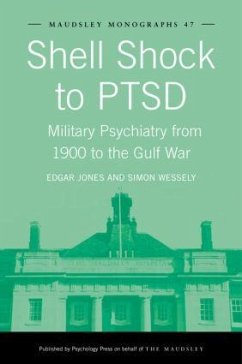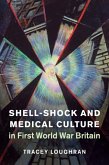- Gebundenes Buch
- Merkliste
- Auf die Merkliste
- Bewerten Bewerten
- Teilen
- Produkt teilen
- Produkterinnerung
- Produkterinnerung
Provides a thought-provoking evaluation of the history and practice of military psychiatry, and places its findings in the context of advancing medical knowledge and the developing technology of warfare.
Andere Kunden interessierten sich auch für
![To Die but Once To Die but Once]() Jacqueline WinspearTo Die but Once20,99 €
Jacqueline WinspearTo Die but Once20,99 €![Shell Shock in France, 1914 1918 Shell Shock in France, 1914 1918]() Charles S. MyersShell Shock in France, 1914 191826,99 €
Charles S. MyersShell Shock in France, 1914 191826,99 €![Shell-Shock and Medical Culture in First World War Britain Shell-Shock and Medical Culture in First World War Britain]() Tracey Loughran (University of Essex)Shell-Shock and Medical Culture in First World War Britain45,99 €
Tracey Loughran (University of Essex)Shell-Shock and Medical Culture in First World War Britain45,99 €![They Called It Shell Shock They Called It Shell Shock]() Stefanie LindenThey Called It Shell Shock43,99 €
Stefanie LindenThey Called It Shell Shock43,99 €![Paranoia Paranoia]() Daniel FreemanParanoia65,99 €
Daniel FreemanParanoia65,99 €![Argonauts of the Western Pacific Argonauts of the Western Pacific]() Bronislaw MalinowskiArgonauts of the Western Pacific42,99 €
Bronislaw MalinowskiArgonauts of the Western Pacific42,99 €![Experiencing Cities Experiencing Cities]() Mark Hutter (USA Rowan University)Experiencing Cities118,99 €
Mark Hutter (USA Rowan University)Experiencing Cities118,99 €-
-
-
Provides a thought-provoking evaluation of the history and practice of military psychiatry, and places its findings in the context of advancing medical knowledge and the developing technology of warfare.
Hinweis: Dieser Artikel kann nur an eine deutsche Lieferadresse ausgeliefert werden.
Hinweis: Dieser Artikel kann nur an eine deutsche Lieferadresse ausgeliefert werden.
Produktdetails
- Produktdetails
- Maudsley Series
- Verlag: Taylor & Francis Ltd
- Seitenzahl: 320
- Erscheinungstermin: 25. April 2005
- Englisch
- Abmessung: 240mm x 161mm x 22mm
- Gewicht: 604g
- ISBN-13: 9781841695808
- ISBN-10: 1841695807
- Artikelnr.: 22890551
- Herstellerkennzeichnung
- Libri GmbH
- Europaallee 1
- 36244 Bad Hersfeld
- gpsr@libri.de
- Maudsley Series
- Verlag: Taylor & Francis Ltd
- Seitenzahl: 320
- Erscheinungstermin: 25. April 2005
- Englisch
- Abmessung: 240mm x 161mm x 22mm
- Gewicht: 604g
- ISBN-13: 9781841695808
- ISBN-10: 1841695807
- Artikelnr.: 22890551
- Herstellerkennzeichnung
- Libri GmbH
- Europaallee 1
- 36244 Bad Hersfeld
- gpsr@libri.de
Jones, Edgar; Wessely, Simon
Introduction. Part 1:Pre-1914 British Military Psychiatry. Wind Contusions,
Nostalgia and Other Early War Syndromes. Irritable Heart and the Crimea.
Disordered Action of the Heart. The Lunatic House, Chatham. 'D Block',
Royal Victoria Hospital, Netley. The Boer War: DAH and Rheumatism. Railway
Spine. Traumatic Neurastenia. The Russo-Japanese War. Balkan Wars
(1912-13). Discussion. Part 2: Shell Shock and War Neuroses. Organisation
of British Military Psychiatry. The Problem of Shell Shock. French
Neurological Centres. British Forward Psychiatry. Psychiatry in the
American Expeditionary Force. Base Hospitals. Psychical Treatments. DAH:
The Continuing Problem. Gas Hysteria. Chemical Warfare: US Experience.
Discussion. Part 3:Military Psychiatry in the Interwar Period.
Psychiatrists in the Aftermath of World War One. Southborough Report. The
Impact of the Military on Civilian Psychiatry. The Doldrums: Military
Psychiatry in the 1920s and 1930s. Shell Shock in the Twenties and
Thirties. Ex-Services Mental Welfare Society. Preparing for War.
Discussion. Part 4: Recruitment of Psychiatrists. Dunkirk. No. 41 General
(Neuropathic) Hospital. Belmont Hospital, Sutton: Slater and Sargant. Mill
Hill EMS Hospital: Lewis and Jones. Directorate of Army Psychiatry:
Management and Organisation. The Western Desert: The Rediscovery of PIE.
No. 78 Neuropathic Hospital. Italy. D-Day and Northwest Europe. US Forward
Psychiatry. Post-War Evaluation. Treatment in the UK: Hollymoor Military
(P) Hospital, Northfield. Innovation in Treatment. 'Lack of Moral Fibre'.
Discussion. Part 5:Screening and Selection. Experimental Phase. Screening
World War Two. United Kingdom. Outcomes Screening: United States. Outcomes
Screening: United Kingdom. Why Did Screening Fail in World War Two? Korean
War. Post-1953. Post-Traumatic Stress Disorder. Discussion. Part 6:
Post-1945: Korea, Vietnam and the Falklands. Restructuring for Peace.
Post-War Re-evaluation: US Forces. Korean War. Medical Organisation.
Psychiatric Casulties. Combat Exhaustion. Somatisation and Cold Injury.
Vietnam: The Early Years. The Veterans Come Home. The Epidemiological
Evidence. Vietnam: Conclusions. Falklands. Discussion. Part 7:War Pensions
and Veterans' Pressure Groups. The Royal Hospital, Chelsea. The Boer War
(1899-1902). World War One: Ministry of Pensions and Shell Shock. Veterans'
Pressure Groups. The British Legion. Curtailment of Pensions. The Horder
Conference. Impact of War. Comrades Associations. US Veterans Groups and
the Vietnam War. Glossary of Technical Terms.
Nostalgia and Other Early War Syndromes. Irritable Heart and the Crimea.
Disordered Action of the Heart. The Lunatic House, Chatham. 'D Block',
Royal Victoria Hospital, Netley. The Boer War: DAH and Rheumatism. Railway
Spine. Traumatic Neurastenia. The Russo-Japanese War. Balkan Wars
(1912-13). Discussion. Part 2: Shell Shock and War Neuroses. Organisation
of British Military Psychiatry. The Problem of Shell Shock. French
Neurological Centres. British Forward Psychiatry. Psychiatry in the
American Expeditionary Force. Base Hospitals. Psychical Treatments. DAH:
The Continuing Problem. Gas Hysteria. Chemical Warfare: US Experience.
Discussion. Part 3:Military Psychiatry in the Interwar Period.
Psychiatrists in the Aftermath of World War One. Southborough Report. The
Impact of the Military on Civilian Psychiatry. The Doldrums: Military
Psychiatry in the 1920s and 1930s. Shell Shock in the Twenties and
Thirties. Ex-Services Mental Welfare Society. Preparing for War.
Discussion. Part 4: Recruitment of Psychiatrists. Dunkirk. No. 41 General
(Neuropathic) Hospital. Belmont Hospital, Sutton: Slater and Sargant. Mill
Hill EMS Hospital: Lewis and Jones. Directorate of Army Psychiatry:
Management and Organisation. The Western Desert: The Rediscovery of PIE.
No. 78 Neuropathic Hospital. Italy. D-Day and Northwest Europe. US Forward
Psychiatry. Post-War Evaluation. Treatment in the UK: Hollymoor Military
(P) Hospital, Northfield. Innovation in Treatment. 'Lack of Moral Fibre'.
Discussion. Part 5:Screening and Selection. Experimental Phase. Screening
World War Two. United Kingdom. Outcomes Screening: United States. Outcomes
Screening: United Kingdom. Why Did Screening Fail in World War Two? Korean
War. Post-1953. Post-Traumatic Stress Disorder. Discussion. Part 6:
Post-1945: Korea, Vietnam and the Falklands. Restructuring for Peace.
Post-War Re-evaluation: US Forces. Korean War. Medical Organisation.
Psychiatric Casulties. Combat Exhaustion. Somatisation and Cold Injury.
Vietnam: The Early Years. The Veterans Come Home. The Epidemiological
Evidence. Vietnam: Conclusions. Falklands. Discussion. Part 7:War Pensions
and Veterans' Pressure Groups. The Royal Hospital, Chelsea. The Boer War
(1899-1902). World War One: Ministry of Pensions and Shell Shock. Veterans'
Pressure Groups. The British Legion. Curtailment of Pensions. The Horder
Conference. Impact of War. Comrades Associations. US Veterans Groups and
the Vietnam War. Glossary of Technical Terms.
Introduction. Part 1:Pre-1914 British Military Psychiatry. Wind Contusions,
Nostalgia and Other Early War Syndromes. Irritable Heart and the Crimea.
Disordered Action of the Heart. The Lunatic House, Chatham. 'D Block',
Royal Victoria Hospital, Netley. The Boer War: DAH and Rheumatism. Railway
Spine. Traumatic Neurastenia. The Russo-Japanese War. Balkan Wars
(1912-13). Discussion. Part 2: Shell Shock and War Neuroses. Organisation
of British Military Psychiatry. The Problem of Shell Shock. French
Neurological Centres. British Forward Psychiatry. Psychiatry in the
American Expeditionary Force. Base Hospitals. Psychical Treatments. DAH:
The Continuing Problem. Gas Hysteria. Chemical Warfare: US Experience.
Discussion. Part 3:Military Psychiatry in the Interwar Period.
Psychiatrists in the Aftermath of World War One. Southborough Report. The
Impact of the Military on Civilian Psychiatry. The Doldrums: Military
Psychiatry in the 1920s and 1930s. Shell Shock in the Twenties and
Thirties. Ex-Services Mental Welfare Society. Preparing for War.
Discussion. Part 4: Recruitment of Psychiatrists. Dunkirk. No. 41 General
(Neuropathic) Hospital. Belmont Hospital, Sutton: Slater and Sargant. Mill
Hill EMS Hospital: Lewis and Jones. Directorate of Army Psychiatry:
Management and Organisation. The Western Desert: The Rediscovery of PIE.
No. 78 Neuropathic Hospital. Italy. D-Day and Northwest Europe. US Forward
Psychiatry. Post-War Evaluation. Treatment in the UK: Hollymoor Military
(P) Hospital, Northfield. Innovation in Treatment. 'Lack of Moral Fibre'.
Discussion. Part 5:Screening and Selection. Experimental Phase. Screening
World War Two. United Kingdom. Outcomes Screening: United States. Outcomes
Screening: United Kingdom. Why Did Screening Fail in World War Two? Korean
War. Post-1953. Post-Traumatic Stress Disorder. Discussion. Part 6:
Post-1945: Korea, Vietnam and the Falklands. Restructuring for Peace.
Post-War Re-evaluation: US Forces. Korean War. Medical Organisation.
Psychiatric Casulties. Combat Exhaustion. Somatisation and Cold Injury.
Vietnam: The Early Years. The Veterans Come Home. The Epidemiological
Evidence. Vietnam: Conclusions. Falklands. Discussion. Part 7:War Pensions
and Veterans' Pressure Groups. The Royal Hospital, Chelsea. The Boer War
(1899-1902). World War One: Ministry of Pensions and Shell Shock. Veterans'
Pressure Groups. The British Legion. Curtailment of Pensions. The Horder
Conference. Impact of War. Comrades Associations. US Veterans Groups and
the Vietnam War. Glossary of Technical Terms.
Nostalgia and Other Early War Syndromes. Irritable Heart and the Crimea.
Disordered Action of the Heart. The Lunatic House, Chatham. 'D Block',
Royal Victoria Hospital, Netley. The Boer War: DAH and Rheumatism. Railway
Spine. Traumatic Neurastenia. The Russo-Japanese War. Balkan Wars
(1912-13). Discussion. Part 2: Shell Shock and War Neuroses. Organisation
of British Military Psychiatry. The Problem of Shell Shock. French
Neurological Centres. British Forward Psychiatry. Psychiatry in the
American Expeditionary Force. Base Hospitals. Psychical Treatments. DAH:
The Continuing Problem. Gas Hysteria. Chemical Warfare: US Experience.
Discussion. Part 3:Military Psychiatry in the Interwar Period.
Psychiatrists in the Aftermath of World War One. Southborough Report. The
Impact of the Military on Civilian Psychiatry. The Doldrums: Military
Psychiatry in the 1920s and 1930s. Shell Shock in the Twenties and
Thirties. Ex-Services Mental Welfare Society. Preparing for War.
Discussion. Part 4: Recruitment of Psychiatrists. Dunkirk. No. 41 General
(Neuropathic) Hospital. Belmont Hospital, Sutton: Slater and Sargant. Mill
Hill EMS Hospital: Lewis and Jones. Directorate of Army Psychiatry:
Management and Organisation. The Western Desert: The Rediscovery of PIE.
No. 78 Neuropathic Hospital. Italy. D-Day and Northwest Europe. US Forward
Psychiatry. Post-War Evaluation. Treatment in the UK: Hollymoor Military
(P) Hospital, Northfield. Innovation in Treatment. 'Lack of Moral Fibre'.
Discussion. Part 5:Screening and Selection. Experimental Phase. Screening
World War Two. United Kingdom. Outcomes Screening: United States. Outcomes
Screening: United Kingdom. Why Did Screening Fail in World War Two? Korean
War. Post-1953. Post-Traumatic Stress Disorder. Discussion. Part 6:
Post-1945: Korea, Vietnam and the Falklands. Restructuring for Peace.
Post-War Re-evaluation: US Forces. Korean War. Medical Organisation.
Psychiatric Casulties. Combat Exhaustion. Somatisation and Cold Injury.
Vietnam: The Early Years. The Veterans Come Home. The Epidemiological
Evidence. Vietnam: Conclusions. Falklands. Discussion. Part 7:War Pensions
and Veterans' Pressure Groups. The Royal Hospital, Chelsea. The Boer War
(1899-1902). World War One: Ministry of Pensions and Shell Shock. Veterans'
Pressure Groups. The British Legion. Curtailment of Pensions. The Horder
Conference. Impact of War. Comrades Associations. US Veterans Groups and
the Vietnam War. Glossary of Technical Terms.








